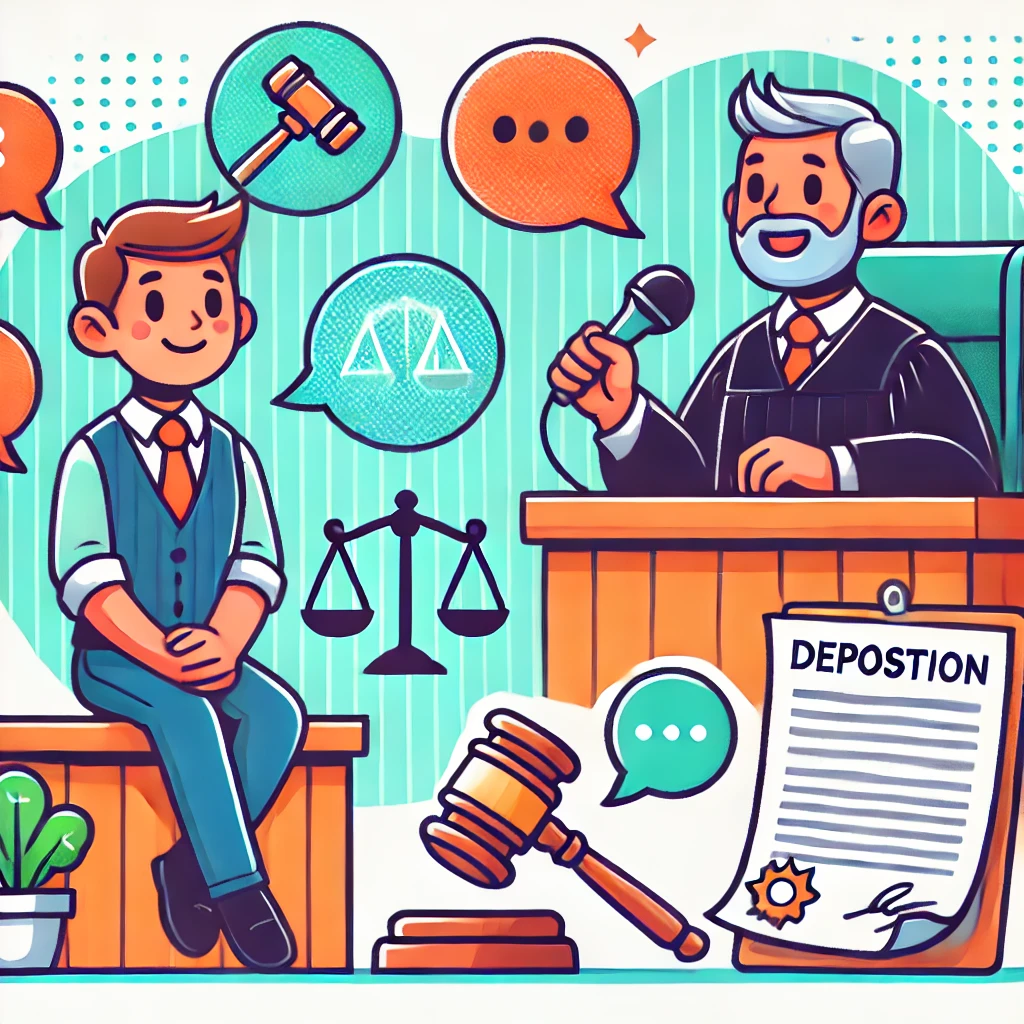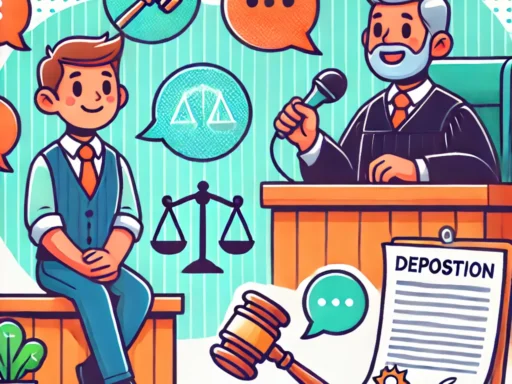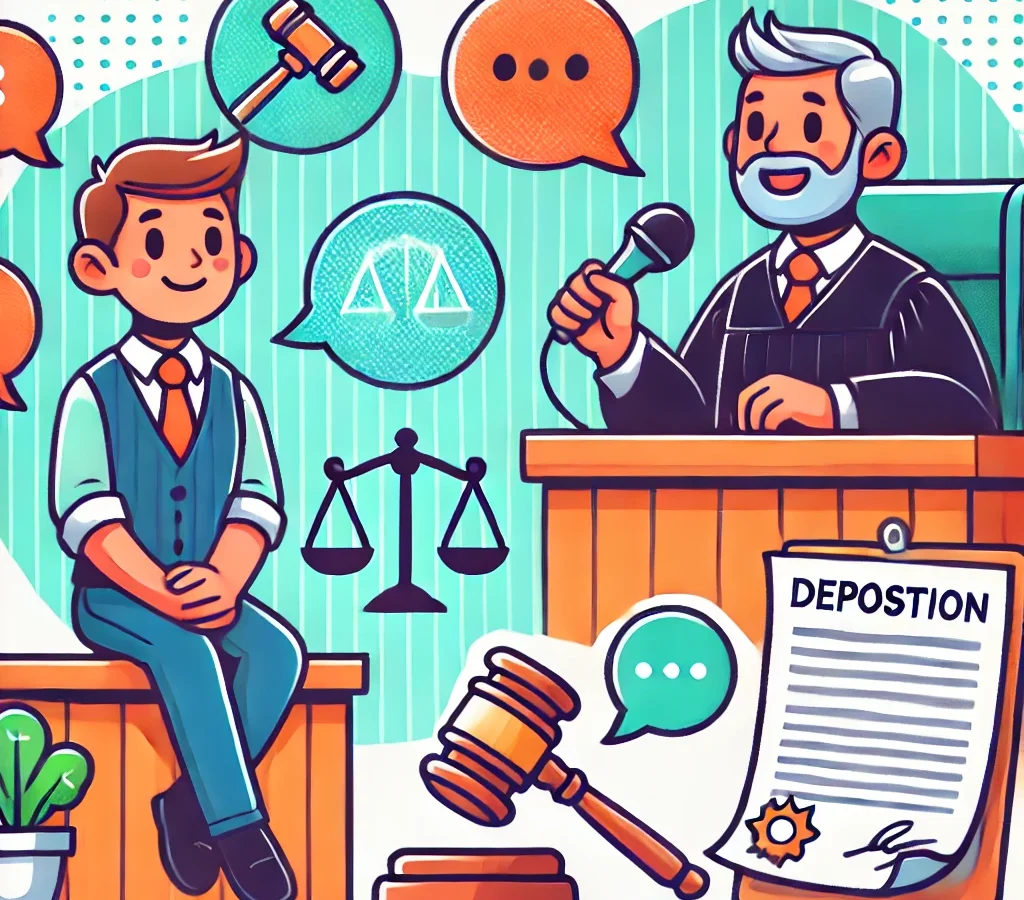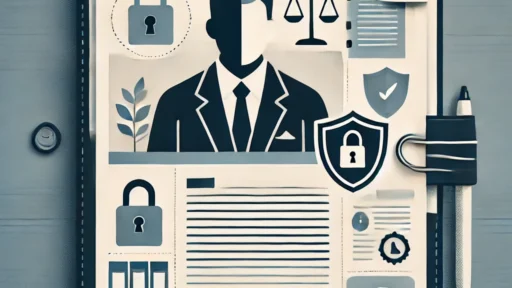In the realm of legal disputes, deposition testimony can be a game-changer during settlement negotiations. This powerful tool provides a wealth of information that can significantly influence the outcome of a case. Attorneys who skillfully leverage deposition testimony often find themselves in a stronger bargaining position, capable of steering negotiations in their clients’ favor.
This article delves into the nuances of utilizing deposition testimony to maximize negotiation outcomes, offering practical tips and expert advice for attorneys aiming to refine their approach.

Understanding Deposition Testimony
Deposition testimony serves as sworn, out-of-court statements given under oath during the discovery phase of a lawsuit. Attorneys use depositions to gather factual information and assess the credibility of witnesses before trial. Every word in a deposition becomes part of the official record, making it a critical component in legal strategies.
The deposition process entails both direct and cross-examination of witnesses, enabling attorneys to explore the witness’s knowledge and reliability comprehensively. Direct examination involves questioning by the attorney who requested the deposition, while cross-examination is conducted by opposing counsel to challenge the testimony’s validity.
Importance Of Deposition Testimony In Settlements
Deposition testimony carries significant weight in settlement negotiations. Its ability to provide a reliable, sworn account of the facts helps attorneys gauge the strength and weaknesses of a case. Deposition records, including verbatim transcripts and video recordings, uncover inconsistencies and admissions that can alter the direction of negotiations.
Witness credibility, established through depositions, plays a critical role. Attorneys use testimony to test how a witness might perform in court, making it a valuable tool in predicting trial outcomes. This credibility evaluation determines the risk each party faces if the case proceeds to trial, thus guiding settlement decisions.
Deposition testimony also aids in outlining damages and liability. By extracting detailed information under oath, attorneys develop a clearer picture of the case, assisting in formulating realistic settlement terms. This means depositions not only influence whether a settlement occurs but also affect the settlement amount.
During negotiations, attorneys leverage deposition excerpts to highlight strengths and expose weaknesses in the opposing party’s case. Strategic use of these excerpts promotes favorable settlement outcomes by pressuring the opposing party to concede on critical points.
Strategies For Leveraging Deposition Testimony
Attorneys use various strategies to leverage deposition testimony effectively in settlement negotiations. These methods ensure that the information gathered can be maximized to influence the outcome positively.
Highlighting Key Testimonies
Attorneys emphasize pivotal testimonies, drawing attention to crucial statements that bolster their case. For instance, they highlight admissions of liability, confirmations of crucial facts, or strong denials. These key excerpts are often presented through direct transcripts or video clips, showcasing the witness’s genuine demeanor and reactions.
Identifying Inconsistencies
Inconsistencies in deposition testimony weaken a witness’s credibility and undermine the opposing party’s case. Attorneys meticulously review transcripts to spot contradictions between deposition statements and other evidence or prior statements.
These inconsistencies are highlighted to question the reliability of the witness and create doubt. For example, if a witness changes their account of events, this discrepancy is leveraged to discredit their testimony.
Using Expert Witnesses
Expert witnesses provide critical insights that support a party’s claims and counter opposing arguments. Their deposition testimony offers authoritative opinions that validate key points of the case.
Attorneys strategically use these expert opinions to enhance their negotiation position, underscoring the strength of their evidence. For instance, an expert’s interpretation of technical data can clarify complex issues, making it harder for the opposing party to refute the claims.
Legal Considerations
Admissibility
Depositions offer information, but it must be admissible in court to influence settlements. Rules of evidence, including relevance and reliability, determine admissibility. For example, Federal Rules of Evidence govern these aspects in federal courts.
Attorneys scrutinize deposition content, excluding hearsay and speculative statements. Ensuring admissibility increases leverage in negotiations.
Privilege Issues
Privilege issues can arise during depositions, affecting their use in settlements. Attorney-client privilege protects confidential communications between lawyers and clients. For instance, privileged information disclosed during depositions can’t be used in court.
Work product doctrine covers materials prepared for litigation. Understanding these privileges, attorneys safeguard sensitive information while leveraging facts beneficial to negotiations.
Common Challenges and How to Address Them
Attorneys encounter several challenges when leveraging deposition testimony in settlement negotiations. Addressing these obstacles can significantly impact negotiation outcomes.
Preparing Witnesses
Witness preparation is crucial in overcoming deposition challenges. If witnesses aren’t adequately prepared, their testimony may include inconsistencies or lapses in memory, reducing the testimony’s credibility. Identifying potential vulnerabilities in a witness’s statements and fortifying their responses through thorough preparation mitigates these risks. Attorneys should also simulate questioning scenarios to help witnesses remain composed under pressure.
Managing Opposing Counsel
Opposing counsel may use various tactics to disrupt deposition testimony. Interruptions and objections can create a fragmented record, complicating the presentation of a coherent argument during negotiations. Remaining focused and composed allows attorneys to maintain control despite these tactics.
Additionally, understanding and anticipating opposing counsel’s strategies can help counteract their efforts, ensuring that key testimonies are effectively highlighted.
Best Practices for Leveraging Deposition Testimony
Deploying best practices during settlement negotiations can transform deposition testimony into a powerful tool for achieving favorable outcomes.
Effective Communication
Effective communication is vital in leveraging deposition testimony. Attorneys must articulate key points clearly and highlight inconsistencies without causing confusion. Ensuring that all legal team members understand and agree on negotiation strategies fosters a unified approach.
Utilizing visual aids, including deposition excerpts and video segments, can enhance the persuasive impact of the testimony. Additionally, active listening to opposing counsel’s rebuttals allows for real-time adjustments to negotiation strategies, maximizing the testimony’s effectiveness.
Maintaining Ethical Standards
Maintaining ethical standards is non-negotiable in using deposition testimony. Attorneys must respect all legal and ethical boundaries while presenting evidence. Transparently presenting testimony, avoiding manipulation or selective quoting, ensures credibility and strengthens the negotiation stance.
Refraining from tactics that might mislead the opposing party or the mediator aligns with professional ethics and fosters genuine settlement discussions. Furthermore, addressing any ethical breaches by opposing counsel promptly showcases integrity and solicits fair negotiation practices.
Maximize Your Settlement Negotiations with BlueNotary’s Expert Notarization Services
Effectively leveraging deposition testimony can be a game-changer in settlement negotiations. Ensure all your deposition documents are properly notarized and legally binding with BlueNotary’s secure and efficient online notarization platform. This guarantees the authenticity and reliability of your evidence, strengthening your negotiation position.
Elevate your legal strategy and secure favorable settlements. Register with BlueNotary today to streamline your notarization needs and enhance the power of your deposition testimony. BlueNotary: Your trusted partner in achieving successful settlement negotiations through credible and well-prepared testimony!
Frequently Asked Questions About Deposition Testimony
Q1. What is deposition testimony?
Deposition testimony is the sworn out-of-court testimony given by a witness during the discovery phase of a legal case. It is recorded and can be used as evidence in court or during settlement negotiations.
Q2. How can deposition testimony be used in settlement negotiations?
Deposition testimony can be used to highlight strengths and weaknesses in a case, encourage parties to settle to avoid the uncertainty of a trial, and provide a factual basis for negotiating terms.
Q3. What are the benefits of using deposition testimony in negotiations?
The benefits include providing clear and detailed evidence, establishing credibility, revealing inconsistencies in the opposing party’s case, and creating a compelling argument for settlement.
Q4. How should attorneys prepare deposition testimony for negotiations?
Attorneys should review the testimony thoroughly, identify key points that support their case, organize evidence clearly, and anticipate counterarguments from the opposing party.
Q5. Can deposition testimony affect the settlement amount?
Yes, strong deposition testimony can significantly influence the settlement amount by demonstrating the strength of a case, thereby encouraging the opposing party to offer a more favorable settlement to avoid trial.








